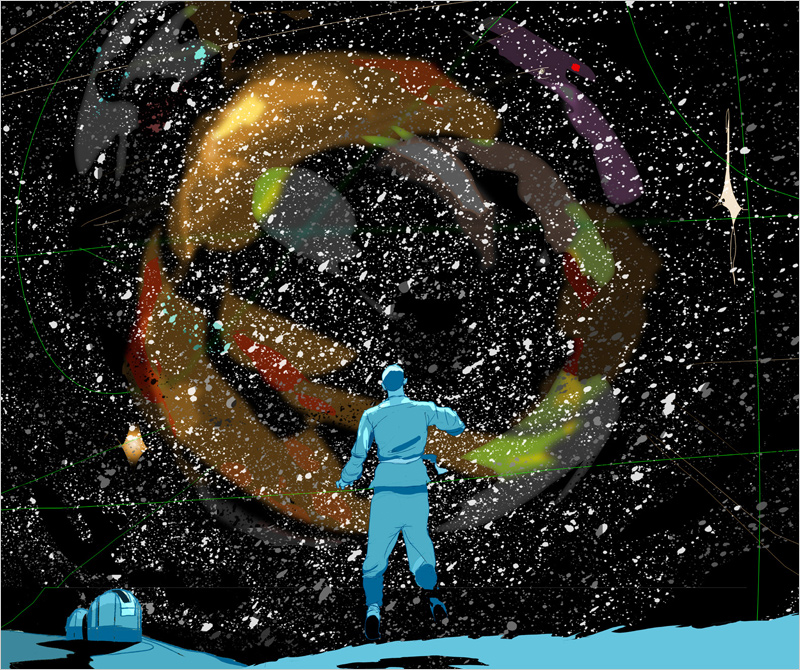I have heard a story, and I have always loved it.
A psychoanalyst was visiting a madhouse. He asked the superintendent about a madman who was crying and weeping and beating his head against the wall. He had a beautiful picture of a woman in his hand. Asked the psychoanalyst, ‘What has happened to this man?’ The superintendent said, ‘This man loved this woman very much. He went mad because the woman did not agree to marry him. That’s why he has gone mad.’ Logical, simple, but next door to him was another madman and he was also crying and weeping and beating his head. He had a picture of the same woman in his hand, and he was spitting on the picture and using four letter words. Asked the psychoanalyst, ‘What has happened to this man? He has the same picture. What is the matter?’ The superintendent said, ‘This man was also madly in love with that same woman, and she agreed and married him. That’s why he is mad.’
Whether a woman rejects or accepts makes no difference; whether you get married or you don’t get married makes no difference. I have seen poor people in misery, I have seen rich people in misery. I have seen failures in misery, I have seen those who have succeeded in misery. Whatsoever you do, finally you come to the goal, and it is misery. Does every road lead to hell? What’s the matter?
Then there seems to be no choice.
Yes, everything leads to misery – if you remain the same. I will tell you another thing: if you change, everything leads to heaven. If you remain the same, it is you, not what you do. What you do is irrelevant. Deep down, it is you. Whether you hate – you will hate – or whether you love – you will love – it is you who finally creates the phenomenon of misery or ecstasy, misery or bliss – unless you change. Just changing from hate to love, from this woman to that woman, this house to that house, won’t help. You are wasting time and energy. You have to change yourself. Why does everything lead to misery?
Patanjali says: THE DISCRIMINATING PERSON REALIZES THAT EVERYTHING LEADS TO MISERY BECAUSE OF CHANGE, ANXIETY, PAST EXPERIENCE….
These words have to be understood. In life, everything is a flux. With such a flux of life you cannot expect anything. If you expect you will be in misery, because expectations are possible in a Fixed and permanent world. In a fluctuating, flux – like world, no expectations are possible. You love a woman; she seems to be very, very happy, but next morning she is not. You loved her because of her happiness, you loved her because she was always smiling, you loved her because she had a quality of being cheerful. But next morning, the cheer has disappeared.
The quality is there no more and she has just become the opposite of her own self. She is miserable, angry, sad, quarrelsome, bitchy – what to do? You cannot expect; everything changes, everything changes every moment. All your expectations will lead you into misery. You marry a beautiful woman, but she can fall ill and the beauty can disappear. Measles can appear and the face can become distorted. Then what will you do? Mulla Nasrudin’s wife said to him once, ‘You don’t seem to love me anymore. Do you remember, or have you forgotten that before the priest you had promised that you would always love me; whether in happiness or in unhappiness, that you would always love me; you would always stand with me in pleasure and in sadness?’ Mulla Nasrudin said, ‘Yes, I promised. I did promise and I remember it well: whether it be a happy moment or an unhappy moment, I would be with you. But I never said to the priest that I would love you in your old age. That was never a part of the promise.’
But old age comes; things change. A beautiful face becomes ugly, a happy person becomes unhappy, a very soft person becomes very hard. Singing disappears and quarrelsome attitudes appear. Life is a flux and everything changes. How can you expect? You expect, then there is misery.
Says Patanjali, ‘Because of change, misery happens.’ If life were absolutely fixed and there were no change – you love a girl and the girl remains always sixteen years of age, always singing, always happy and always cheerful, and you also remain the same, fixed entities – of course then you would not be persons, life would not be life. It would be stony, but at least expectations would be fulfilled.
But there is a difficulty: boredom will come out of it, and that will create misery.
Change will not be there, but then there will be boredom.
If things don’t change, then you get bored. If the wife goes on smiling and smiling and smiling every day, every day, after a few days you will become a little worried – ‘What has happened to this woman? Is her smile real or is she simply acting?’ In acting you can go on smiling. You can create such a discipline of the mouth. I have seen people who even in sleep are smiling; politicians and those types of people who have to continuously smile. Then their lips take a permanent shape.
If you tell them not to smile, they cannot do anything. They will have to smile, it has become a fixed mode. But then boredom is created, and boredom will lead you to misery.
In heaven everything is permanent, nothing changes; every thing remains just as it is – everything beautiful. Bertrand Russell in his autobiography writes, ‘I would not like to go to paradise or heaven because it would be too boring.’ Yes, it would be too boring. Just think of a place where all priests, prophets, tirthankaras and Buddhas have gathered, and nothing changes, everything remains static – no movement. It will look like a painted picture, not really alive.
How long can you live in it? Russell is right; one will get bored, bored to death.
Russell says, ‘If this is going to be heaven, then hell is preferable. At least some change will be there.’
In hell everything is changing, but then no expectations can be fulfilled. This is the trouble with the mind. If life is flux, expectations cannot be fulfilled. If life were a fixed phenomenon, expectations could be fulfilled so much that one would feel bored. Then there would be no zest, enthusiasm. Everything would become dull, tepid – no sensation, no excitement, nothing new happens. In this life where you are living, change creates misery, anxiety. There is always anxiety within you, ALWAYS I say. If you are poor, there is anxiety: how to attain riches? If you become rich, there is anxiety: now how to retain that which you have attained? There is always fear of thieves, robbers, and the government – which is an organized robbery – taxation, and communists are always coming. If you are poor you are in anxiety: how to attain riches? If you have attained you are in anxiety: how to retain that which you have attained? But anxiety continues.
One day a couple came to Osho and the man said, ‘If I’m with the woman there is anxiety, because it is a continuous fight. I’m not happy. If I’m not with the woman, it is continuous anxiety; I am alone.’ Without the woman, then loneliness becomes anxiety. With the woman, the other brings his or her own problems. And problems are not doubled when two persons meet, they are multiplied. Man cannot live alone because loneliness creates anxiety. Man cannot live with a woman, because woman creates anxiety. The same is true for the woman also. Anxiety has become just the style of your life; whatsoever happens, anxiety remains. Past experiences, samskaras, create misery because whenever you move through an experience, it creates a groove in you. If the experience is repeated many, many times, the groove becomes more and more deep. Then if life moves in different ways, and the energy is not flowing in that groove of your past experiences, you feel unfulfilled. But if life continues the same, and the energy goes on flowing from the same groove, you feel bored.
Then you want excitement. If excitement is not there, you feel, ‘What is the use of going on living?’ You cannot eat the same food every day. I can eat the same food; leave me out.
You cannot eat the same food every day. If you eat the same food you feel frustrated because the same food every day loses taste, excitement. If you change food every day, that too will create anxiety and trouble, because the body gets adjusted to the food. And if every day you change, the body chemistry changes and the body feels uncomfortable. The body feels comfortable if you take the same food, but then the mind doesn’t feel comfortable.
If you live through your past habits the body will always feel comfortable, because the body is a mechanism. It doesn’t hanker for the new, it simply wants the same. The body needs routine. Mind always needs change, because the mind itself is a flux phenomenon. Not even for a single moment does mind remain the same; it goes on changing.
I have heard that Lord Byron was said to have lived with hundreds of women.
At least sixty women are absolutely known; there is proof that he loved sixty women. He didn’t live very long, so he must have been changing women on alternate days. But one woman caught him and she forced him to marry her. She would not yield until he married her, she would not give her body until he married her. She knew that he had been in affairs with many women. And once he had made love to a woman, he simply forgot that woman completely – finished. It was the mind of a romantic poet, and poets are never faithful. They cannot be; they live with the mind. Their mind is a flux, like their poetry. It is a vibrating phenomenon. The woman insisted, she was stubborn, so Byron had to yield; he had to marry her. She became very fascinating to him because she would not yield. It became a question of his ego.
As they were coming out of the church, the church bells were still ringing, and the guests were departing. They were on the church steps and Byron held the hand of the woman, the newly wed woman. He had not even made love to her yet, and suddenly he saw another woman passing the road. He forgot the woman whose hand he was holding completely, and he said to the woman, ‘This is wonderful, but for a single moment when I saw that woman passing, I forgot you completely, my marriage and everything. Your hand was not in my hand; I didn’t know about it.’ The woman had also seen it; you cannot deceive women.
Even before you have looked towards another woman, they know. The very flicker of the idea in your mind, and they detect it. They are great detectors, lie-detectors. The woman had also seen it, and she said, ‘I knew.’
This is the mind. He is now finished with that woman, married and finished, attained and finished. There is no excitement now. Now she is possessed, a property. The challenge is there no more.
The challenge creates anxiety because you have to fight your way. Then when you have attained, possessed, it creates another anxiety: the anxiety that you are finished. The whole affair is there no more. It is already boring, already dead.
Anxiety is always there because the way you live creates anxiety. You cannot be satisfied. Through past experiences, samskaras, you become attuned to particular phenomena and the mind says that excitement is needed, change is needed. Then the whole body gets disturbed. Then that too creates anxiety.
Tags: Patanjali Yoga Sutra 20 It Is You










